#labour leadership election
Text
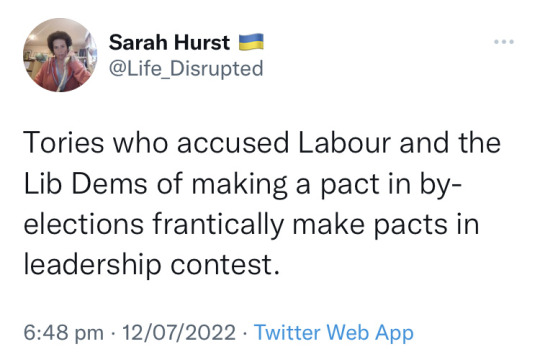
#sarah hurst#political twitter#tory leadership#election pact#uk news#uk politics#conservative party#labour party#liberal democrats
4 notes
·
View notes
Text
liz truss resigning is the actual best birthday present because this country is so monumentally fucked that watching the tories get humiliated is the only joy the news can give me right now
#politics#britain#another leadership election. the tories have never been in this much shit literally ever#if labour can't win the next election they flat out cannot win. god
1 note
·
View note
Text
Experts weigh in on Britain’s Conservative leadership race
Experts weigh in on Britain’s Conservative leadership race
LONDON
Members of Britain’s ruling Conservative Party are currently voting to decide on their next leader, who will also become the next prime minister.
Former Chancellor of the Exchequer Rishi Sunak is facing off against Foreign Secretary Liz Truss. The race was triggered by Prime Minister Boris Johnson’s resignation following a series of scandals that critics said cast doubt on his integrity…
View On WordPress
#Anadolu Agency#Boris Johnson#Britains#Conservative#Conservative leadership race#Conservative Party#election#experts#Labour Party#leadership#liz truss#race#rishi sunak#UK#weigh
0 notes
Text
i keep seeing anti-labour memes about how they're just tory lite and listen. listen i fucking get it ok they suck ass they do. sure kier starmer is flawed as fuck and labour is diluted conservatives sure. but diluted. is still LESS. if this election is gonna be a pick the lesser of two evils situation u gotta nut up and fucking vote for the lesser evil. i don't give a shit. srsly I dont care. I know it sucks I know its bad but u can't. u can't sit it out. u can't protest vote. it won't work. and the tories will stay in power
no matter how much u can hate on starmer (and trust me I hate on him a LOT) he will be better than the tories.
blair was also a labour leader considered tory lite and u kno what? yeah he sucked ass but he got Some shit done. the NHS flourished a lil under his leadership u can hate him all u want for not having been a left enough leader but he was a damn sight better than the tories wudve been
so when the election rolls around u gotta fucking suck it up buttercup. I hate seeing this kind of anti-labour rhetoric even in meme form cus it's just gonna either discourage voting especially among the left, or it will completely split the vote. and then we will b truly fucked.
vote smart. vote labour if u have to. unseat the tories and fucking get them the fuck out of power
#uk politics#im gonna tag this as nuanced#and wait for the hate mail#cus god forbid i have a nuanced take#on the reading comprehension webbed site#but listen. we gotta be smart about this#morals in voting are for local elections#not the general one#in the general election u have to pull ur thumb out and pick whatever option will beat the tories#even if u hate em#sorry#thats just how it is#kier starmer#labour#fuck the tories#tories out#anti tories
108 notes
·
View notes
Text
The droughtula is lasting forever so here are some headcanons about Dracula's characters' politics.
Arthur Holmwood (Lord Godalming)
Let's get the difficult one out of the way first. Arthur is nobility, a hereditary peer in the House of Lords, in the 1890s. He's literally entitled to a say on legislation solely because of who his ancestors were. So he's unlikely to have views that we'd find sympathetic in 2023, and is probably a Tory.
He's well-travelled and outward-looking, so I think his greatest political concern is empire. He's eager to ensure that Britain is victorious in the Scramble for Africa, concerned about growing tensions with the Boers in South Africa, and admires the leadership of Lord Salisbury.
(sorry about this)
Jonathan Harker
I think Jonathan is and always will be aware of how lucky he's been, as an orphan who's then catapulted into vast wealth thanks to the generosity of Mr Hawkins. As a result, I think he would be very keen to support others and generally vote for a government that's focused on the eradication of poverty. At the same time, I don't think he would be particularly radical; I think he would shy away from revolutionary thinking.
I see him finding reasonably a happy home in the 1890s Liberals, and supporting the beginnings of the welfare state in the early 1900s. He might even join the Fabian Society. By the 1920s, his sympathies would shift to the Labour Party.
Mina Harker
I've written a bit about Mina's politics already. The obvious question is what she thinks of women's suffrage, and I'm inclined to say that her view is that women should have the vote one day, but not yet. At least, not at a national level; I think she'd support the move in the 1890s to allow women to vote in local elections. She would be more focused on women's access to education, so that when the time came for them to get the vote, they would be educated enough to use it wisely.
Unfortunately one other thing we know about Mina is that she's interested in physiognomy, a pseudoscience that's connected to eugenics. So it's depressingly plausible that a real-life Mina would have an interest in eugenics as well.
Lucy Westenra
I think Lucy is probably less politically aware than Mina is, but also quite possibly more radical in her views. After all, we see more of Lucy chafing against her social role than we do Mina (though Lucy's life is also a lot more restricted than Mina's). As an upper-middle or upper-class woman, doing charitable works is a big part of her role. That would bring her into contact with poverty, and I think she would want to do whatever she could to help.
I don't think she would be formally a member of any campaigning organisations, but I suspect she might be sympathetic to the temperance movement. That would be her route to women's suffrage, as the two causes were connected in the 1890s. Where Mina might worry that women lacked the education to use their vote wisely, Lucy would feel that in a good marriage, a husband would help his wife to make the right choices.
Abraham Van Helsing
One sec, just need to give myself a crash course in Dutch politics of the 1890s.
OK I'm back. Dutch society at this time was divided based mostly on religion: Protestant, Catholic and a secular socialist grouping. This was called 'Verzuiling' ("pillarisation") and it meant that each of the sections of society were effectively segregated: separate schools, separate institutions, separate newspapers and little intermarriage between the "pillars".
By rights that puts Van Helsing into the Catholic pillar, but I can't see it - this is a man whose close friend is an English Protestant who's half his age. The group most likely to oppose the notion of Verzuiling were the Liberals, sometimes treated as a pillar of their own. And I think that's where Van Helsing would most naturally fit.
People who learned about this bit of Dutch history more than five minutes ago should feel free to chime in.
Quincey Morris
I know about as much about US politics in the 1890s as I do Dutch politics, but that's not going to stop me.
I instinctively feel that Quincey Morris has strong views on something relatively niche, like the adoption of the gold standard. So I'm pleased to learn that the adoption of the gold standard was in fact a live political debate in the US in the 1890s. Quincey is in favour. He supports hard money policies and - as a wealthy landowner - particularly worries about the rise of the People's Party back home.
Jack Seward
The biggest wildcard of the lot. Other than Van Helsing, I think Jack is the character most likely to have read widely and to be open to unexpected ideas. But ultimately I think his attitude to politics is driven by his interest in and desire for technological progress, which would lead him towards the Liberal Party.
He would be horrified by Tory prime minister Lord Salisbury's repeated opposition to change (e.g. his 1879 statement that "Whatever happens will be for the worse, and therefore it is in our interest that as little should happen as possible"). If he lives long enough, he'll be delighted by Wilson's "white heat of technology" speech in the early 1960s.
193 notes
·
View notes
Text
Cathy had voted Labour all her life. Then she heard an LBC interview with Keir Starmer. In it, he was asked if it was “appropriate” that Israel should besiege Gaza, cutting off power and water. “I think Israel does have that right,” Starmer replied. Cathy immediately resigned from the party, which she joined three years ago when Starmer was elected leader. “This has been the last straw,” she tells me. Previous straws, she says, include a raft of policies that Labour had watered down, and Tory policies that Labour would not repeal. But Labour’s position on the siege of Gaza has killed off the little faith she had left.
[...]
The consistency in the position of several Labour voters I spoke to over the past few days is striking. The main assertion: they will not be voting for this Labour party. The reason: the party crossed a line by effectively endorsing Israel’s killing and besieging of civilians. The language of a final reckoning came up a lot: “a red line”, “a line in the sand”, “the straw that broke the camel’s back”, a “mask has slipped”. And the anger is by no means sectarian. “It’s easier to frame it as a Muslim issue,” says Calum, a member who has left the party. “It’s not a Muslim issue. It’s a human one.”
Labour’s damage limitation response did little but entrench this view of an untrustworthy, cynical leadership. It took Starmer days to address his LBC comments, and then, bizarrely, he claimed that he never said them at all. Then there was his visit to a mosque and Islamic centre in south Wales, a sanitation exercise that backfired epically. On social media, Starmer posted images of smiling congregants, saying he had “repeated our calls for hostages to be released, more humanitarian aid to enter Gaza, for water and power to be switched back on, and a renewed focus on the two-state solution”. A statement issued by South Wales Islamic Centre via the Muslim Council of Wales rejected Starmer’s version of how the meeting went, stressing that his “social media post and images gravely misrepresented our congregants and the nature of the visit”.
206 notes
·
View notes
Text
ELECTION NIGHT ENGLAND 2024
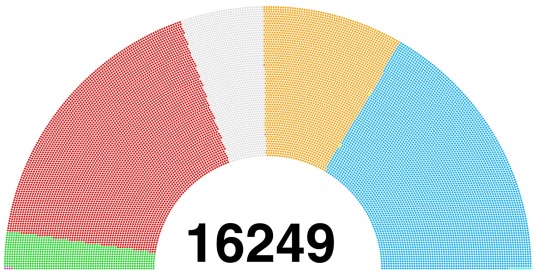
composition of all councils circa 2023:
🌹Labour: 5609
🌳Tory: 5395
🕊️Liberal: 2804
🌻Green: 757
💩Reform: 10
🔥Liberal (1989): 5
🦋Transform: 4
💩SDP (1990): 2
Regionalists, RAs and Others: 1663
these numbers do not include changes over the past year or so – including a number of labour councillors who’ve left the party due to the centralist agenda and the leadership’s support for the genocide
TONIGHT’S ELECTIONS:
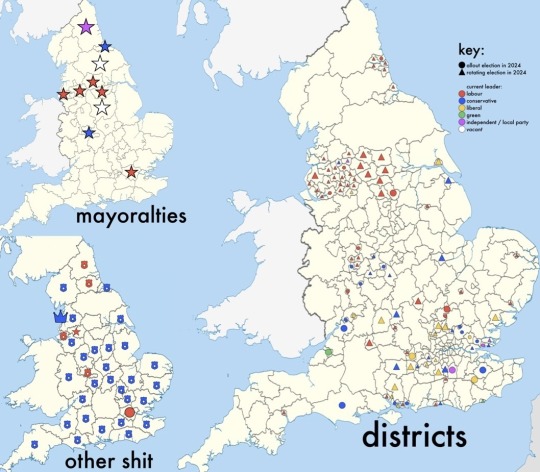
every mayor bar cambridgeshire and the “West of England”
every police commissioner
multiple district councils
london assembly
blackpool south byelection
borough mayor of salford
SEATS UP TONIGHT:
🌳Tory: 989
🌹Labour: 973
🕊️Liberal: 418
🌻Green: 107
Regionalists, RAs and Others: 172
ALLOUT ELECTIONS (all seats are to be elected, whole council can flip): Basildon, Brentwood, Bristol, Cannock Chase, Castle Point, Cheltenham, Dorset, Dudley, Epping Forest, Fareham, Gloucester, Harlow, Havant, North Herts, Maidstone, Nuneaton, Reddit, Rossendale, Rotherham, Stevenage, Stroud, Tandridge, Tunbridge Wells, North Tyne, Warrington, Wokingham, Worcester
PARTIAL / ROTATING ELECTIONS where enough seats are being contested to potentially flip the council, ignoring labour majority defences (bold/italic councils could only be changed to no overall control): Adur, Basingstoke, Bolton, Burnley, Cherwell, Colchester, Elmbridge, Hastings, Hart, Hyndburn, Norwich, Sheffield, Solihull, Stockport, Walsall, Hartlepool, Hull, Milton Keynes, Oxford, West Oxon, Pendle, Peterborough, Portsmouth, Rochford, Rugby, Southend, Tamworth, Thurrock, Welwyn Hatfield
50 notes
·
View notes
Text
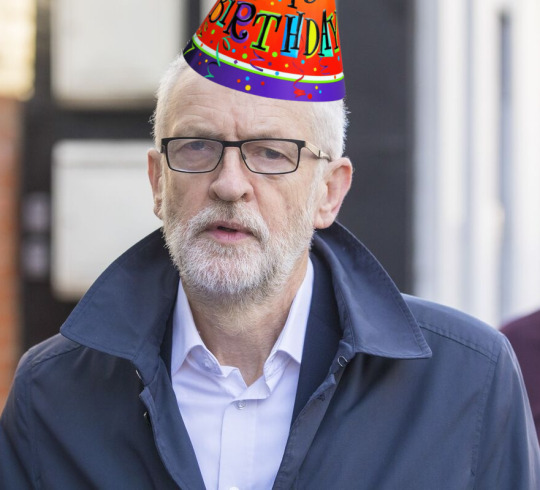
Happy birthday, Jeremy Corbyn! (May 26, 1949)
Leader of the British Labour Party from 2015 to 2020, Jeremy Corbyn has represented Islington North in the British Parliament since 1983. A member of the Labour Party's left wing and an acolyte of Tony Benn, Corbyn has been a vocal opponent of war and interventionism, an advocate for liberation and justice in South Africa, Palestine, and Ireland, and a supporter of socialism in the British tradition. As he made efforts to reorient the Labour Party in a socialist direction during his tenure as leader, he was deliberately and systematically undermined by the party's right wing, which launched a failed leadership challenge in 2016 and dogged him with false claims of antisemitism. After a disappointing electoral result in 2019, Corbyn stepped down as leader and, after the party right regained control, they had the party whip removed from him and refused to endorse his candidacy in the next general election.
"We don't have to be unequal, it doesn't have to be unfair, poverty isn't inevitable, things can and they will change."
233 notes
·
View notes
Note
As an American, I am not as familiar with Britains political system as I should be given that I was a poly-sci major at university... That said, and I have been thinking this for a while now, if there is such a way for you to run for an office or for Prime Minister, you really ought to. I think you have the right drive, and determination to turn the system inside out if you really wanted to... I understand that as a creator, that may not be something you are into, or feel is worth the time, and being trans I understand we are at disadvantage for most popularity contests... (For reasons I dislike discussing, but also feel might be general knowledge at this point... And I don't mean appearance, but rather the gossip/whisper-whisper...) But even putting that thought into peoples minds, win or lose, it makes for the foundation of giant leaps forwards. It forces people to recognize that we exist, and deserve to be treated as human... Whilst unfortunately offering yourself for broad public criticism, of which I would never want for you, as I admire you and your work and what you mean to our community... That said, if any of us could do it, I think it might just could be you...
Just food for though, from an American fan. Love your work, and wishing all the best luck...
(Ps: Sorry for the annoyingly long message.)
In order to become an MP you first need to be selected by the party; there are no primaries in Britain. There are no political parties in Britain who could currently win under our FTTP system who would allow a trans woman to stand
Once you're selected, you need about £80,000 to pay for your campaign, which I do not have
Then you have to actually win the campaign and become an MP
Then you have to wait until a party leadership contest is called and secure enough votes from your party's MPs to be nominated; there are no current parliamentary parties who would allow a trans woman, never mind one with my politics, within a million miles of the leadership contest, cause the last time they allowed a joke candidate to run he became the most popular leader of the labour party ever, twice
then once you become leader of the party you have to survive your own MPs knifing you in the back
then you have to win a general election.
So as much as I'd like to become Prime Minister (and hey why the heck not, I can't be worse than the last few we've had!) I genuinely believe I have better odds of becoming a famous Hollywood actress
520 notes
·
View notes
Text


Fond Farewells Mark the End of an Era for The Crown.
Pt 2 of Season 6 Accedes to the Next Generation – But Reigns Most Triumphant Saluting Its Sovereign.
Review & gifs by L.L @The Crown TV
I wasn't sure what to expect from the final 6 preview episodes of The Crown. Part 1 gifted us with a season-defining performance from Elizabeth Debicki, but such intense focus on the tragedy of Diana and Dodi's deaths was heavy-going. How to move forward?
Not many TV shows stick the landing, but I believe The Crown does, mostly by putting Queen Elizabeth front and centre. In four different ways! But Part 2 takes a while to forge ahead and reign triumphant.
Ed McVey and Meg Bellamy make shy William and swotty Kate believable as a young couple who meet at university – or earlier, as per a flashback with (not Ghost!) Diana. I still found it hard to invest in their will-they-won't-they relationship (we already know they do.)
Instead, it’s sisters Elizabeth and Margaret who have long been the emotional heart of this show; at every stage of their lives.
Former Oscar-nominee Lesley Manville (alongside Queen Imelda Staunton) is truly magnificent in Ep 8 as Princess Margaret, though it's painful watching this vibrant lady struggle as her health worsens.
Memories of the 1940's are a delight. However, I wish we'd seen more of wide-eyed teen Lilibet let loose (Viola Prettejohn) and carefree Marg (Beau Gadsdon) before older Margaret says her final goodbye.
Staunton saves her best for last, bringing dry humour, vulnerability as well as leadership to Ep 10. The 70+ min epic finale 'Sleep, Dearie Sleep' has its shaky moments, but beautifully completes Queen Elizabeth's story when it counts, bringing near-perfect closure. That alone elevates Season 6 beyond Season 5.
Warning - MAJOR SPOILERS AHEAD. This is my final *EVER* review (might be extra long!)
S6 is NOW ON NETFLIX - WATCH THE EPISODES before reading.
Images: courtesy of Netflix
Starting with less good news; the first couple of episodes of Part 2 were my least favourite. Ep 5, 'Willsmania', feels transitional, and a little stuck in the past. Following his mother's death, Prince William (Ed McVey; taking over from younger actor Rufus Kampa) turns inward as he struggles to cope with public attention and grief.
It's an understandable reaction to losing a parent, but Part 1 already spent nearly half a season on Dodi and Diana. It felt like we grieved in real time. As a result, whenever the subject of Diana crops up again in Part 2, it tends to weigh down both pace and narrative.
Ep 6 brings a welcome change of topic. This being The Crown, I'm sure there are critics poised to be offended by Queen Elizabeth's nightmare about Prime Minister Tony Blair being crowned king, but to me, his 'coronation' was hilarious, as was the choir boy singing Blair's cheesy Labour pop anthem.
It felt like deliberate tongue-in-cheek humour, an absurd reminder why monarchy might still be better than populist elected leaders.
I really wanted this episode to work, but it didn't go anywhere, and themes like tradition-vs-modernity were covered more effectively in episodes such as 'Marionettes.' Bertie Carvel has Tony Blair's voice down but suffers from comparisons with Michael Sheen, who was uncanny as the Prime Minister in 3 earlier Peter Morgan projects.
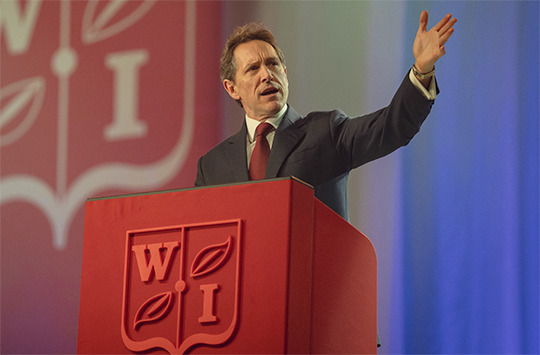
^ PM Tony Blair. The Women's Institute weren't fans of his grandstanding.
The Crown: The Next Generation fully arrives during Ep's 7, 9 & 10. Some will love it. Those who prefer more historical episodes with broader scope may be disappointed, as the show follows William and Kate through University life in the early 2000's.
The newcomers do bring fresh energy to the show. It helps that they cast Ed McVey and Meg Bellamy, who make a sweet couple as Will and Kate, even if William sometimes comes across as petulant.
Unlike Ed McVey as William, Luther Ford doesn't bear much physical resemblance to Prince Harry, other than red hair. Ford does however put in a good performance as Harry becomes increasingly reckless.
The Crown doesn't hide either Harry or William's bad behaviour. The brothers seem to get on well at the start, but it later seems like they're more at odds. Underneath a lot – a LOT – of boozing, both boys appear quietly screwed-up over their mother's death. Neither of them seem to enjoy playing happy families with Charles, either.
The show mostly concentrates on William and Kate, but there aren't many episodes left to develop a genuine romance. They have potential, but it feels fairly surface level. Suddenly, they rush to move into a house share together when we've barely seen them kiss. They (and we) needed more screen time to really get to know each other.
There's a bigger issue here with Kate's mother, Carole Middleton (Eve Best.) Pushy parent Carole is keen to play matchmaker between her 'commoner' daughter and the young eligible Prince, keeping tabs on William. Carole isn't as conniving, but ... didn't we just watch a similar storyline with Mohamed Al-Fayed/Dodi/Diana in Part 1?
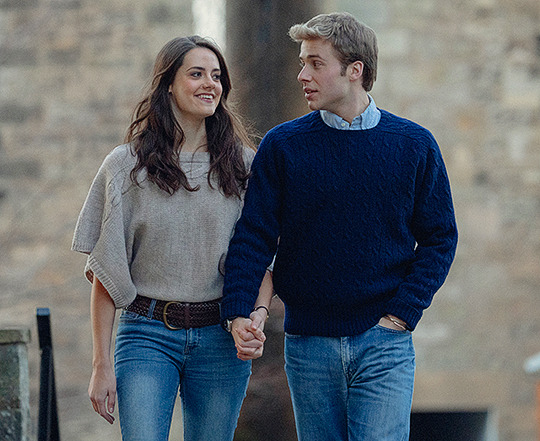
^ Kate 'n' Will. Her Mum would frame this picture.
Ep 8 'Ritz' plays like a standalone film. Margaret's final story is touching, but upsetting, at times; I was a fan of Diana, yet sobbed as much for Margaret as the credits rolled, even though her eventual death isn't shown. In fact, her final goodbye is sensitively done and stands as a fitting tribute to the princess, as well as to the Queen.
Lesley Manville makes Margaret's predicament so real as her health slowly breaks down. She bounces back from one stroke, then another hits. How awful too for Elizabeth to watch a much-loved sister deteriorate, though it was wonderful to see Lilibet read Margaret a bedtime story. It brought out the warmer side of Staunton's Queen.
The scene where Margaret scalds her feet in the bath is genuinely horrifying. I've suffered from ill health and loss of control myself and this was so much worse. I could feel her pain. That poor woman.
Human moments are where The Crown excels; through this episode, this working-class lass from a council house could somehow relate to a Princess in a palace. Peter Morgan has surely done more to humanise the royal family than any P.R team ever could.
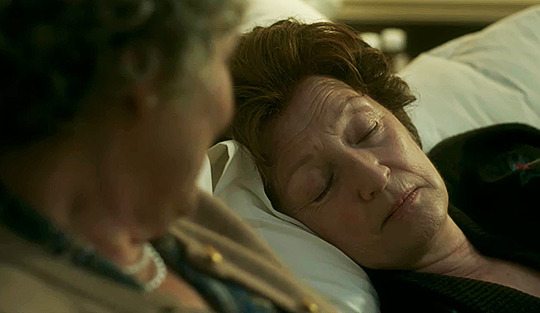
^ Fans of Margaret (and Lesley Manville) prepare yourselves for her sad final journey.
Onto the big reveal: when I mentioned at the start there are FOUR ways Queen Elizabeth appears – this is what I meant:-

^ Newcomer Viola Prettejohn plays teenage Princess Elizabeth.
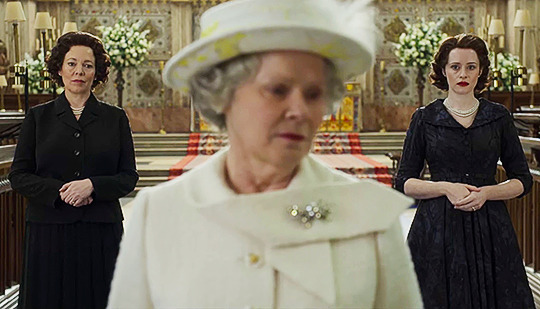
^ & there's Olivia Colman & Claire Foy alongside older Queen Imelda Staunton.
Satisfyingly, all 3 of The Crown's leading ladies return to close the show. Olivia Colman and Claire Foy each have an additional scene, too (I won't spoil the entire finale, as it covers a lot of ground in over 70 mins, but Olivia and Claire aren't back as 'ghosts.')
As we get older, the ghosts who speak loudest are our own; the former versions of us we berate ourselves with. Not everyone may warm to the Queen (sort of) talking to herself, but personally, I was thrilled to see these talented actors on screen together.
Foy's scene with Staunton is particularly effective, as the younger Queen gives her older self an old-fashioned dutiful talking to. It's somehow also credible that they're aspects of the same person.
It reminded me of Peter Morgan’s 2013 (extraordinary) play, ‘The Audience', which inspired this series, and included scenes where Helen Mirren shared the stage with young Elizabeth. That play is also why this theatre-fan started watching The Crown to begin with, and later went on to create this website.
When Ep 10 finished playing, my Netflix returned itself to Season 1. 60 episodes over 7 years! I will miss the grand scale of The Crown, but appreciate the legacy which remains. Now feels like the right time for this story to end. A full-circle moment in more ways than one.
**Majestic thanks for reading, and to every person who has liked, reblogged, messaged, supported The Crown TV for all these years.
💎♕You each deserve a Crown of your own!♕💎**
N.B: These are my humble opinions at this point in time. No offence is intended. Agreement = lovely; not compulsory. Disagreement = happens; kindly coexist. Ta!
#the crown#queen elizabeth ii#imelda staunton#princess margaret#lesley manville#tony blair#bertie carvel#william and kate#ed mcvey#meg bellamy#viola prettejohn#claire foy#olivia colman#reviews#articles#season 6#pt 2#gifs#the crown spoilers
82 notes
·
View notes
Text
Ask Me Anything -- Adin Klees
How did you learn to cook?
Just through experience, I guess? People have got to eat. It’s something you start doing as you grow up and you get better at it over time.
Did you ever want to join Arborea or were you unable to?
Uh… no? I mean, I never really thought about it? I never really wanted to immigrate anywhere and couldn’t afford to if I did, and if I was going to it’d probably be to somewhere more similar to home. Not sure why I’d ever go to Arborea. I mean, my mum grew up there, I guess?
Is this your first time in a leadership position?
It’s certainly my first time as a spaceship captain. I’ve run smaller projects. Had my distribution network and all that. Ran a very small courier company for awhile.
If you could wake up any animal you wanted and had a valid reason to do so, what would you wake up?
Atlantic salmon. I would raise it and cook it.
What was becoming captain like -- did you expect them to elect you?
No! I expected Lina or Tinera. Lina’s the most sensible person on this ship and Tinera’s got a knack for resource and labour management that I don’t have; sheer experience in the Lunar mines, probably. I definitely didn’t expect them to pick me.
It has been. Stressful.
Are you alright? Do you need anything?
Yeah an Atlantic salmon. Or just a cup of actually fresh coffee. Maybe a planet under my feet.
70 notes
·
View notes
Note
I wondered what you thought about the rumours of a lot of Tory MPs preparing letters of no confidence in Truss, do you think they’re going to destroy themselves this quickly?
LMAOOOOOO THEY ARE DEFINITELY GOING TO DESTROY THEMSELVES THIS QUICKLY
Honestly I think what people maybe haven't fully internalised is that the Tory party as it currently exists is entirely, irreparably, irrevocably broken. That's it. They're done. They've done the one thing that is the death knell for any political organisation.
They schismed.
We talk a lot about how leftist infighting sinks progressive movements, but the fact is, the right are not immune to that either, and the Tories have done it. They now cannot heal from this quickly enough. They are a fractured, splintered mess, bleeding coherent messages. Look at the leadership battle! Liz Truss is such a great example. To get votes, she had to simultaneously promise that she
Was against Boris Johnson and approved of him leaving
Was loyal to Johnson and wished he was still here
Was a Remainer
Is a Brexiteer
Loves queer people and their rights
Hates "woke rubbish" and will get rid of trans rights
Will improve the economy and give people more money and services
Will cut tax for the rich and butcher services
Every campaign promise was a contradiction. It had to be. None of them agree on what they want anymore. And she was not alone in that; Sunak had to tie himself in knots over his Johnson stance and it still didn't work.
They'll eventually come back from this, of course. But it's going to take years before there's a cohesive party again, and that will destroy them at the ballot box. They can't even hang onto a prime minister between elections anymore. On YouGov, Labour are currently polling 17 points ahead; that is the highest lead since these polls began. And there is no way they can possibly fix themselves by the next election, assuming we even make it until then.
466 notes
·
View notes
Text
In the final days of Manitoba’s provincial election, a controversial campaign adviser for Heather Stefanson’s Manitoba PCs is spreading unfounded allegations of election fraud on far-right livestreams ahead of voting day.
Ken Lee, a former leadership candidate who was disqualified by the party but recently brought back as a campaign adviser during the election, appeared on a September 26 Facebook livestream hosted by Winnipeg-based far-right activist Todd MacDougall.
MacDougall, host of the “Winnipeg Alternative Media” channel, is a former member of the “Proud Boys,” a group later designated as a terrorist entity in Canada.
During the appearance, Lee shared conspiratorial claims about election fraud, rigged voting machines as well as other unsubstantiated allegations about labour unions, the Manitoba NDP and Elections Manitoba. [...]
Continue Reading.
Tagging: @vague-humanoid, @politicsofcanada
#cdnpoli#Manitoba#provincial elections#Progressive Conservatives#Conservatives#Heather Stefanson#reactionary politics#fascism#corruption#terrorism#white supremacy
76 notes
·
View notes
Text
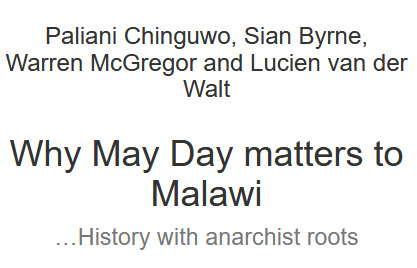
Storm centre
Chicago was the storm centre: the third largest US city where the elite flaunted its wealth in the face of poor American and immigrant workers. Chicago saw the largest 1 May demonstrations, against the backdrop of terrible working conditions and poverty, worsened by economic depression.
The power of the Chicago movement rested not just on numbers, but also on revolutionary ideas. It was the anarchist International Working People’s Association (IWPA) that led the massive march of 80 000 people through Chicago, growing during the following days to 100 000.
IWPA leadership included black women like ex-slave Lucy Parsons, immigrant workers like Spies and Americans like Oscar Neebe and Albert Parsons.
Its Pittsburgh Proclamation called for ‘the destruction of class rule through energetic, relentless, revolutionary and international action’ and ‘equal rights for all without distinction of sex or race.’
Internationalist in outlook, the IWPA and the Chicago-based anarchist Central Labour Union (CLU) it led, fought for all working and poor people, regardless of race or nationality. It published 14 newspapers, organised armed self-defence and mass movements, and created a rich tapestry of revolutionary counter-culture like music.
Anarchists rejected elections in favour of mass organising and education. Elections, the IWPA said, achieved nothing much: the State was part of the system of elite rule; politicians were corrupted into the ruling elite. Instead, most IWPA activists stressed unions as the basis for genuine workers’ and farmers’ democracy: unions should undertake factory occupations, leading to an anarchist (free) society.
#history#Malawi#May Day#labor#malawian politics#anarchism#resistance#autonomy#revolution#community building#practical anarchism#anarchist society#practical#anarchy#daily posts#communism#anti capitalist#anti capitalism#late stage capitalism#organization#grassroots#grass roots#anarchists#libraries#leftism#social issues#economics#anarchy works#environmentalism#environment
16 notes
·
View notes
Text
Liz Truss is the most disastrous and unpopular leader in modern British history. Mortgage holders and small businesses still loathe her for sending interest rates through the roof. Her short, catastrophic premiership is routinely compared unfavourably to the shelf life of a lettuce. (A comparison first made by the bright leader writers at the Economist to give credit where it is due.)
When Labour wins the next election, its triumph will be in part the result of the public’s reaction against her vast and dogmatic economic folly.
If you were Liz Truss, you might retire from public life. At the very least you would apologize and hang your head in shame.
If readers expect contrition, however, they have yet to learn that being on the radical right means never having to say you are sorry.
Truss’s demotion from national leader to national joke has not embarrassed her in the slightest but pushed deep into paranoid conspiracism.
Her autobiography, bizarrely titled Ten Years to Save the West, as if the fate of liberal democracy depended on the advice of an epic failure, shows that, despite all she did to this country, her eyes still shine with a bright, self-righteous fanaticism, as if the sockets are backlit by an idiot’s lantern,
Chutzpah used to be defined as murdering both your parents and asking the court for clemency because you are an orphan. In Truss’s case it is using the power of the prime minister to crash the economy and then claiming she was a powerless victim of the liberal elite.
Her writing is as lacking in self-awareness as it is powered by self-righteousness.
At one point she says in all innocence that, when Boris Johnson resigned in the summer of 2022, her agent encouraged her to join the race to be prime minister, as the campaign might be good for her profile.
But she reports that he then wisely added “it would be for the best if I came second”.
Later she informs us that during the leadership campaign she “frankly lost trust in many of my erstwhile ministerial colleagues who were supporting my opponent [Rishi Sunak].
“They had spent the last six weeks not just attacking me but seeking to undermine my plans, saying my agenda was unworkable."
Truss never stops to think that the few people who will finish this book will believe that her agent was right, and it would clearly have been for the best if she had never been prime minister.
Nor does she contemplate the possibility that her agenda was indeed “unworkable”, and was proved to be unworkable when her unfunded tax cuts and fuel subsidies sent the price of gilts shooting up, the value of the pound crashing down, and caused a crisis in the pension industry for good measure.
And yet, and yet…Mock her as much as you like. Please don’t hold back on my account. But you cannot dismiss her.
There are two reasons why Truss is still dangerous. The first lies in the strength of the right-wing clique that brought her to power.
It is true that Liz Truss did not become prime minister by winning over Conservative MPs. As with Jeremy Corbyn’s leadership of the Labour party, Truss’s career illustrates the danger of expecting leaders who do not have the support of a plurality of their colleagues to function in a Parliamentary democracy.
But she still beat Rishi Sunak with the votes of 57 percent of Tory members.
And with the honourable exception of the Times, the Tory press was all for her. “In Liz We Trust”, said the Express “Cometh the Hour, Cometh the Woman”, cried the Mail. “Liz Puts Her Foot on the Gas”, cheered the Sun.
Kwasi Kwarteng set off a market panic as he put Truss’s ideas into practice in the mini budget of September 2022. The reaction of right-wing papers was not one of alarm, however, but of adoration.
“At last”, gushed the Daily Mail, “a True Tory Budget”. A Daily Telegraph commentator said it was “the best Budget I have ever heard a British Chancellor deliver”.
Meanwhile the Truss premiership allowed the voodoo economics of the US-influenced (and in all probability US-financed) think tanks to finally impose itself on this luckless country. The Centre for Policy Studies welcomed the mini-budget saying it was “exactly what we would have hoped for”. The Taxpayers’ Alliance called it “the most taxpayer-friendly budget in recent memory”.
Robert Saunders of Queen Mary University made the unarguable point that Truss was not an aberration or some alien figure that had appeared from nowhere to take over the Conservative party.
Follow the money that cascaded in from party donors, he said, and “the Truss premiership begins to look less like the personal failure of a flawed individual, and more like a systemic disaster for which the party bears collective responsibility”.
Those forces will dominate the Conservative party after its defeat and drive it to the radical right. Indeed, in opposition the members, the think tanks, the press and the ideologue donors will become more important, for they will be all the party has.
In a sign of things to come, Truss is already allying with Nigel Farage, and even Rishi Sunak says he will not ban Farage from joining Conservative party.
Despite her failure, Truss remains a potent figure on the radical right because of her championing of revanchism, which is now its dominant emotion.
This isn't a book. It’s a 300-page wail of resentment at a world that will not do as it is told.
I have no problem with conservatives complaining about woke policies taking over institutions. Only a fool or liar maintains that progressive biases among supposedly impartial organisations are an invention of the right,
But the woke conspiracy Truss invokes is of a wholly different order. It is utterly fantastical.
To recap, Truss's unfunded subsidies and tax cuts panicked the bond markets. They would not lend to a country whose leaders lacked plausible means of meeting its debts. Or if they did lend they would demand an additional yield on government bonds, which became known in plain-speaking financial markets as the “moron premium”: the extra cost that comes with lending to a nation run by idiots.
In her apologia Truss, who still poses as a Thatcherite, no longer sees markets as an expression of the wisdom of crowds, but as a conspiracy to do her down.
“I came to realise there is no such thing as ‘the market’ in this sense. Rather, there are groups of influential individuals in the financial establishment, all of whom know and speak to one another in a closed feedback loop. The Treasury, the Bank of England, and the OBR are deeply embedded in these social networks and share the same beliefs in the established economic orthodoxy."
The markets were at fault for not seeing her financial genius. Financial traders were the world’s unlikeliest lefties. Even though she and Kwarteng fired the permanent secretary at the Treasury and cut out the Bank of England and Office for Budget Responsibility from policy making, they were still, somehow, responsible for Tory failure.
“The powerful vested interests there pushed back, made my life very difficult and ultimately got me fired,” Truss concludes.
Older readers may remember a time when Conservatives insisted on personal responsibility. You were not allowed to blame crime on poverty or your failings on a bad childhood. You were accountable.
But the case of Liz Truss proves that these morality tales were only ever for the poor. In her mind, the economy collapsed not because of decisions she made but because of “a sustained whispering campaign by the economic establishment, encouraged and fueled by my political opponents in the Conservative Party who refused to accept my mandate to lead”.
Trumpism is the end point of such conspiracism and revanchism, and Truss goes all the way down the line to the terminus.
She mutters about the “deep state” a Trumpian phrase she uses without irony or self-knowledge.
And even though her support for Ukraine was her redeeming feature during her time as foreign secretary and prime minister, she is now supporting the pro-Putin Trump and his allies in Congress who are denying aid to Kyiv.
Truss is finished. But the resentment born of failure and the fury at modernity ensures Trump is still very much with us.
If he delights Putin and wins in November, the UK and Europe will learn the hard way that the real threat to Western civilisation comes from Liz Truss and her friends.
17 notes
·
View notes
Text
The Palestinian people have tried every method to achieve some form of meaningful self-determination. ‘Renounce violence’, they were told. They did, apart from the odd reprisal after an Israeli atrocity. Among Palestinians at home and in the diaspora, there was massive support for Boycott, Divestment and Sanctions: a peaceful movement par excellence, which began to gain traction worldwide among artists, academics, trade unions and occasionally governments. The US and its NATO family responded by trying to criminalize BDS across Europe and North America – claiming, with the help of Zionist lobby groups, that boycotting Israel was ‘antisemitic’. This has proved largely effective. In Britain, Keir Starmer’s Labour Party has banned any mention of ‘Israeli apartheid’ at its upcoming national conference. The Labour left, scared of being expelled, has fallen silent on this issue. A sorry state of affairs. Meanwhile, most of the Arab states have joined Turkey and Egypt in capitulating to Washington. Saudi Arabia is currently in negotiations, mediated by the White House, to officially recognize Israel. The international isolation of the Palestinian people looks set to increase. Peaceful resistance has gone nowhere.
All the while, the IDF has attacked and killed Palestinians at leisure, while successive Israeli governments have worked to sabotage any hope of statehood. Recently, a handful of former IDF generals and Mossad agents have admitted that what is being done in Palestine amounts to ‘war crimes’. But they only plucked up the courage to say this after they’d already retired. While still serving, they fully supported the fascist settlers in the occupied territories, standing by as they burned houses, destroyed olive plantations, poured cement in wells, attacked Palestinians and drove from their homes while chanting ‘Death to the Arabs’. So, too, did Western leaders – who let all this unfold without a murmur. The age of political reason had long departed, as Qabbani would say.
Then, one day, the elected leadership in Gaza begins to fight back. They break out of their open-air prison and cross Israel’s southern border, striking at military targets and settler populations. Palestinians are suddenly top of the international headlines. Western journalists are shocked and horrified that they are actually resisting. But why shouldn’t they? They know better than anyone that the far-right government in Israel will retaliate viciously, backed by the US and the mealy-mouthed EU. But even so, they are unwilling to sit by as Netanyahu and the criminals in his cabinet gradually expel or kill most of their people. They know that the fascist elements of the Israeli state would have no compunction about sanctioning the mass murder of Arabs. And they know this must be resisted by any means necessary. Earlier this year, Palestinians watched the demonstrations in Tel Aviv and understood that those marching to ‘defend civil rights’ did not care about the rights of their occupied neighbours. They decided to take matters into their own hands.
Do the Palestinians have a right to resist the non-stop aggression to which they are subjected? Absolutely. There is no moral, political or military equivalence as far as the two sides are concerned. Israel is a nuclear state, armed to the teeth by the US. Its existence is not under threat. It’s the Palestinians, their lands, their lives, that are. Western civilization seems willing to stand by while they are exterminated. They, on the other hand, are rising up against the colonizers.
80 notes
·
View notes